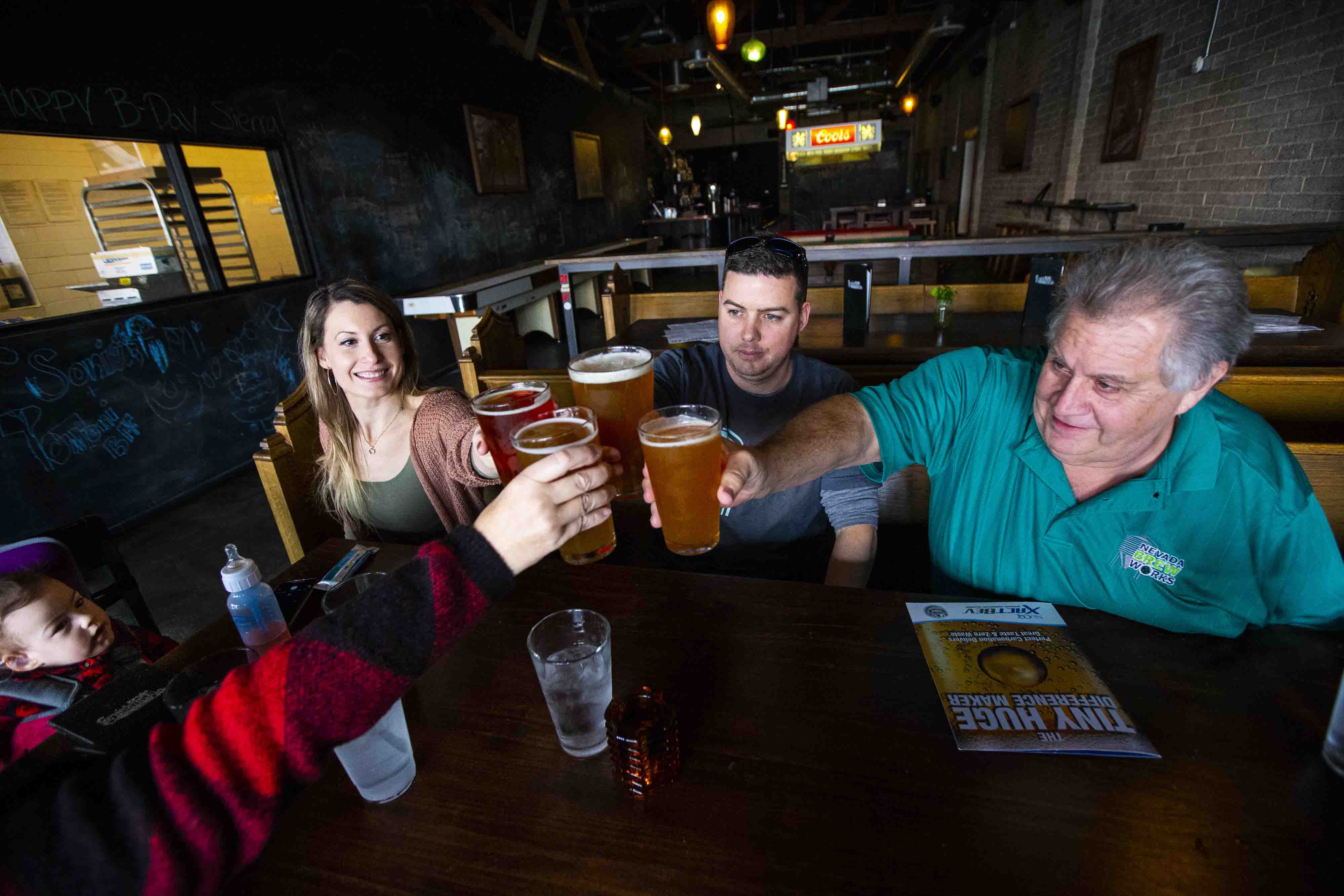They risked everything on a dream: honoring daughter, opening a brewery
When he can’t sleep at night, which these days is often,
Jason Taylor feels like a man walking a financial tightrope: Stay steady, he tells himself, and keep your eyes fixed on the far ledge. And whatever you do, don’t look down.
When you’ve risked your entire life to achieve a dream of brewing and serving your own beer — pledging your savings, mortgaging your home, plunging deep into debt — you can’t afford to think about failure. Still, the 35-year-old Midwest native can’t help himself.
“It’s pretty scary,” he said. “We’re walking a little bit into the unknown. Every day, I have nightmares about going bankrupt.”
In a few weeks, Jason and his wife, Lauren, plan to open Nevada Brew Works craft brewery in the city’s burgeoning Arts District, fulfilling a vision Jason has nursed since college. Taking up residence at the corner of Main Street and Imperial Avenue, they’ll transform a defunct auto body shop into what they hope will become the “best damned taproom in the state.”
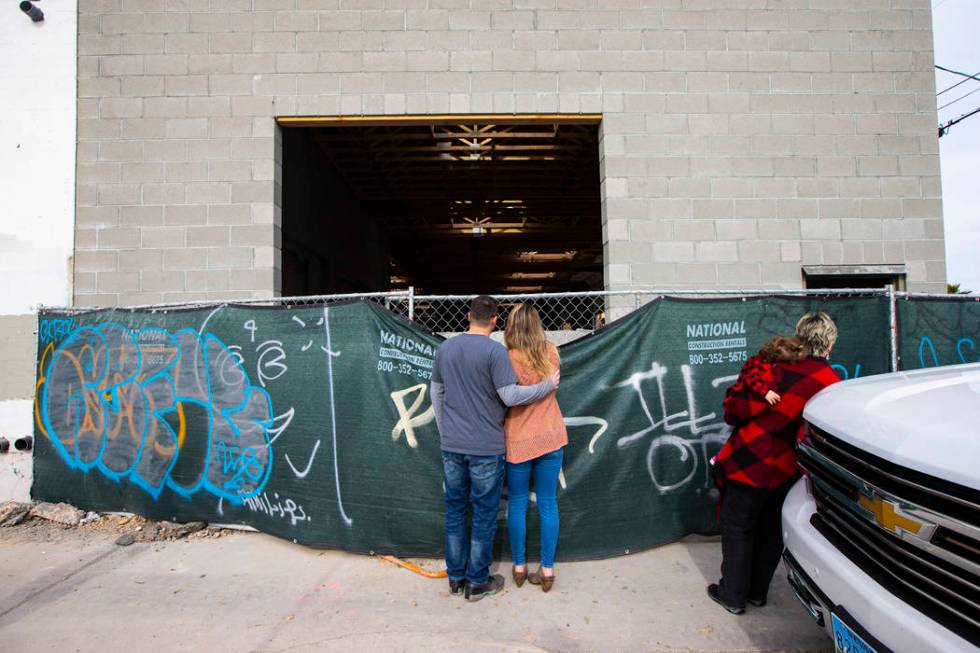
The venture comes with sizable risk since 1 in 5 new restaurant ventures nationwide fail in their first year. Still, the Taylors have put their Summerlin house up as collateral, invested $200,000 in life savings and taken out a $750,000 small business loan.
And there is another major challenge.
The couple’s 3-year-old daughter Ariana suffers from cerebral palsy and other developmental issues that could tax any parents, let alone two who are working regular jobs while devoting nights and weekends to planning a business launch. Even with a full-time nanny to help care for Ariana, there don’t seem to be enough hours in the day.
“We both take time from our jobs to take Ariana to her appointments,” said Lauren, who works as a physician assistant. “We work seven days a week, with Ariana and our jobs. Sometimes, it’s easier to be at work, because Ariana might have four appointments in one day, and feeding her and lifting her in and out of the car is strenuous.”
Jason and Lauren met at Purdue University and beer quickly became a theme in their courtship. Not just any beer, but craft brews, made by hand. They drank it, critiqued it, experimented with it and eventually envisioned creating their own.
Jason, whose nickname is “JT,” drank his first beer at age 11, a Busch Light, and winced at its bitter taste. It wasn’t long before he found he loved hefeweizens, with their wheaty taste and aroma. “It was my gateway beer,” he said.
After he graduated college with an engineering degree, he frequented a local craft brewery, the oldest in Indiana. He liked the vibe — cozy yet social — with bands that played on the second floor. Maybe one day he’d open a place like this.
Lauren, 33, had her own path to craft beer artisanship. The Chicago-area native remembers the pungent smell of hops as she rollerbladed in her basement as a girl, the yeasty aroma of her father Ken’s homebrew setup.
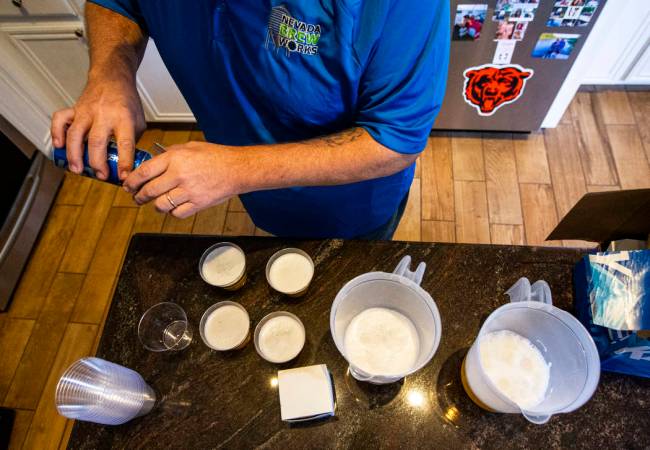
She got a waitressing job at a microbrewery, learned more about craft ale, and discovered she preferred hearty Belgian beers.
On their first night out, JT told her about his brewery dream.
What a coincidence, Lauren said: Her dad had been making his own beer for years.
They got married in a Midwestern microbrewery, with a beverage menu that included eight cases of wheat beer Ken cooked up for the event.
Weighing just 30 ounces
They moved to Las Vegas in 2009 after JT was laid off from a construction company job in Los Angeles. Lauren went back to school to become a physician assistant.
By 2016, they owned a house in Summerlin. JT was a general manager for an electrical equipment manufacturing company and Lauren had found work in her field.
Lauren’s father, Ken Hallyburton, retired from his job as a diesel mechanic at UPS and started planning his move to Las Vegas to become brewmaster.
Then Lauren got pregnant with Ariana.
Midway through her term, Lauren’s body began to swell. Her wedding ring no longer fit and she struggled to open her hands each morning. Then one winter night in January 2017, Lauren hemorrhaged. After several harrowing hours, with mother and baby’s life in peril, doctors delivered a baby girl by cesarean section.
Born a staggering 14 weeks early, weighing just 30 ounces, the infant was rushed to the neonatal intensive care unit before her mother could hold her. Lauren had suffered a placental abruption, a potentially fatal condition in which the placenta tears away from the uterus.
She remained in the NICU for 117 days while her parents worried whether she had suffered cerebral damage. Months later, they got their answer: Along with spastic quadriplegic cerebral palsy, Ariana had brain damage as well as neurological deafness known as ANSD, auditory neuropathy spectrum disorder, which requires her to have hearing aids. She was nonverbal and nonmobile.
Yet she was alive. And she was home.
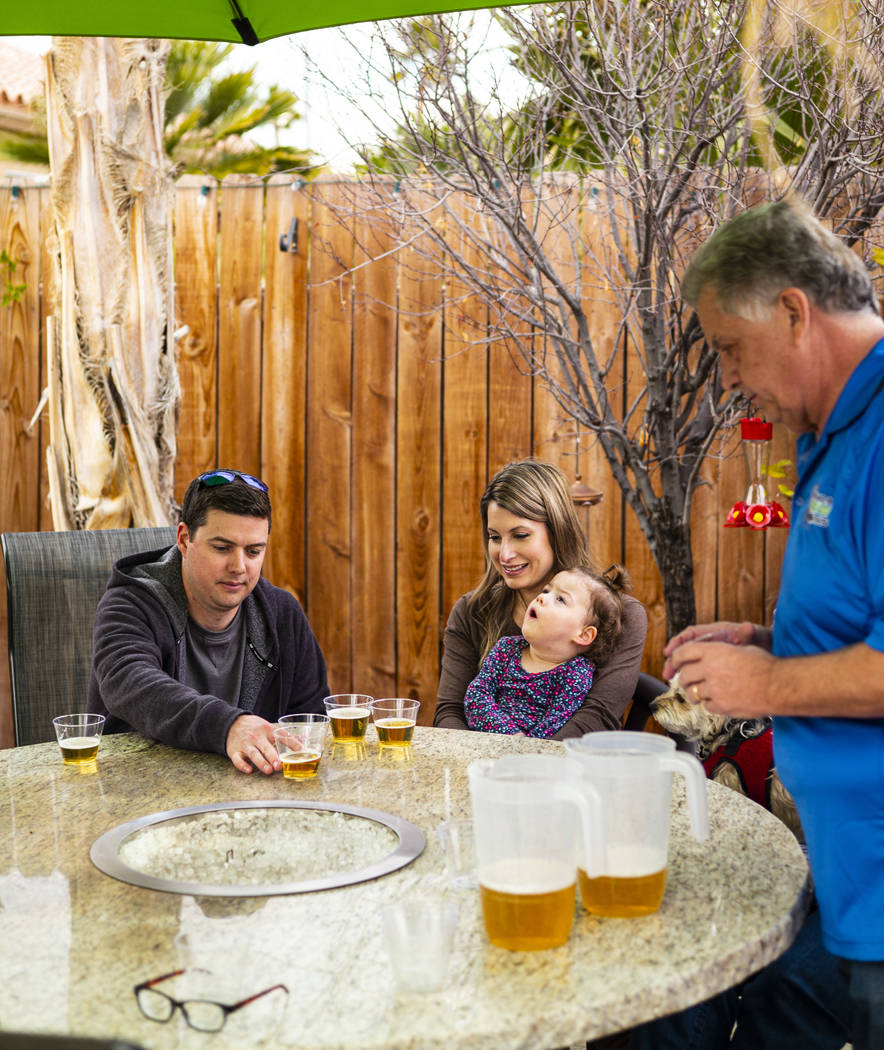
Lauren’s mother, Caren Hallyburton, said the family scrambled to pay for expensive medical equipment while still pursuing their brewhouse dream.
“This baby was a catalyst. That brewery is no longer just their dream, now it’s the family’s legacy, something they can give to this child,” she said. “One day, they can tell Ariana that ‘We did this for you,’ to show her that anything is possible. Ariana will be a part of it all.”
Ariana’s middle name is “Rye,” combining a critical beer ingredient with an homage to JT’s older brother Ryan, who died of cancer at age 39.
The beer will be called Ariana Rye. New beers will be named for other physically challenged children to raise money to help pay for therapy and medical equipment.
‘This isn’t normal’
For the duration of her pregnancy, delivery and her daughter’s first years of life, Lauren recorded video — capturing moments big and small, happy and heart-wrenching, all to a rock and indie soundtrack, the music of her youth.
She loved being pregnant, the process, the tiny steps. The video captures stages of her unborn baby’s development, Lauren standing by a placard, comparing the size of the fetus to fruits. “You are the size of a raspberry.” Then a cherry, a lime, a lemon and a coconut.
At 21 weeks, she learned she was having a girl.
Not long after, as JT made pasta for dinner, Lauren hemorrhaged.
“I instantly thought, ‘I’ve lost my baby. She’s gone.’ ”
At the hospital, doctors and nurses swarmed. One doctor said the words no expectant mother wants to hear: “This isn’t normal. This isn’t good. We’re doing everything we can to save this baby.”
Ariana was born at 2:27 a.m. in the neonatal intensive care unit. Nurses spirited her into an incubator.
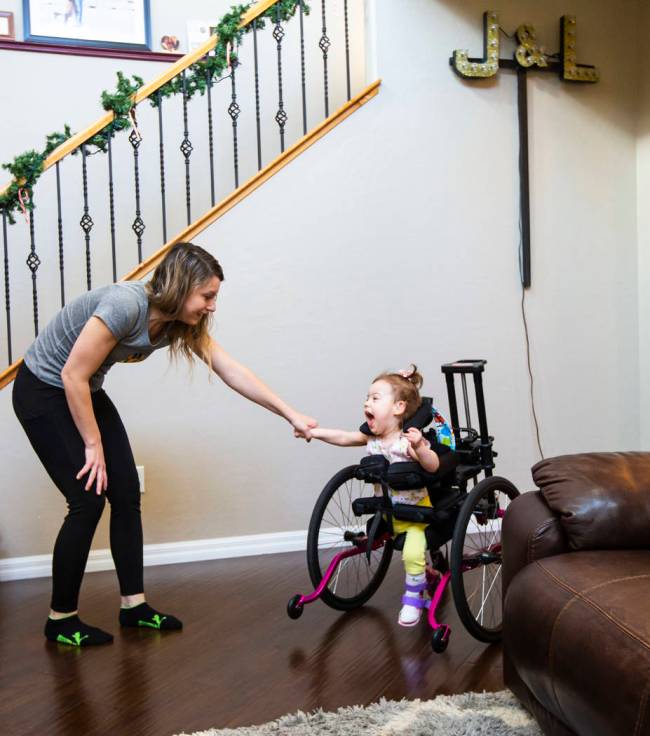
“It was traumatic, the grief I felt,” Lauren said. “A baby’s delivery should be the happiest day of your life. It wasn’t for me.”
Lauren went home one week later, but returned to the hospital daily to help tend to her newborn, a tiny preemie wrapped in plastic, tubes everywhere.
One of the series of photos captured on video shows a diamond ring around Ariana’s ankle, dwarfing it. “On Day 11, I finally got to hold you (with the help of a nurse),” the subtitles say. Ariana’s foot was the size of her mother’s thumb.
After nearly four months in the hospital, Ariana finally went home. Her parents still did not have a long-term prognosis.
At home, there were more ominous signs. Ariana was not holding her head up. She had a slight brain bleed and had failed several hearing tests. “Every day, there was a gray cloud,” Lauren said.
In late November, their fears were confirmed: Ariana had cerebral palsy.
“The diagnosis doesn’t change how much I love her,” Lauren says.
At 6 months, Ariana weighed 15.5 pounds. Lauren hired a nanny and began working three days a week so she could take her daughter to frequent medical appointments.
As Ariana developed, JT and Lauren faced new medical costs: One device was an adaptive “stander” that helped her bear weight on her legs. A special baby “Go-To” seat helped her sit up independently. Lauren applied for grants and special insurance and received support from Henderson-based Little Miss Hannah Foundation, which assists Nevada families with life-limiting special needs.
She connected online with mothers of other special needs children. One day, she texted Sarah Klein, an Ohio woman whose son Oliver suffers from cerebral palsy and neurological issues, and who could not afford the special baby seat.
Lauren had told Sarah of her brewery dream, but then she had another idea: Why not name a beer after Oliver to raise money for his care, and maybe make donations to the Little Miss Hannah Foundation. Maybe they could honor a different child with a namesake beer each month and feature videos that tell their story and raise awareness? Lauren also would raise money through a Kickstarter video campaign.
Klein was floored by her generosity. “It’s one thing to launch a new business, but then to do something like this. The need is so great in the special needs community, and Lauren has an answer.”
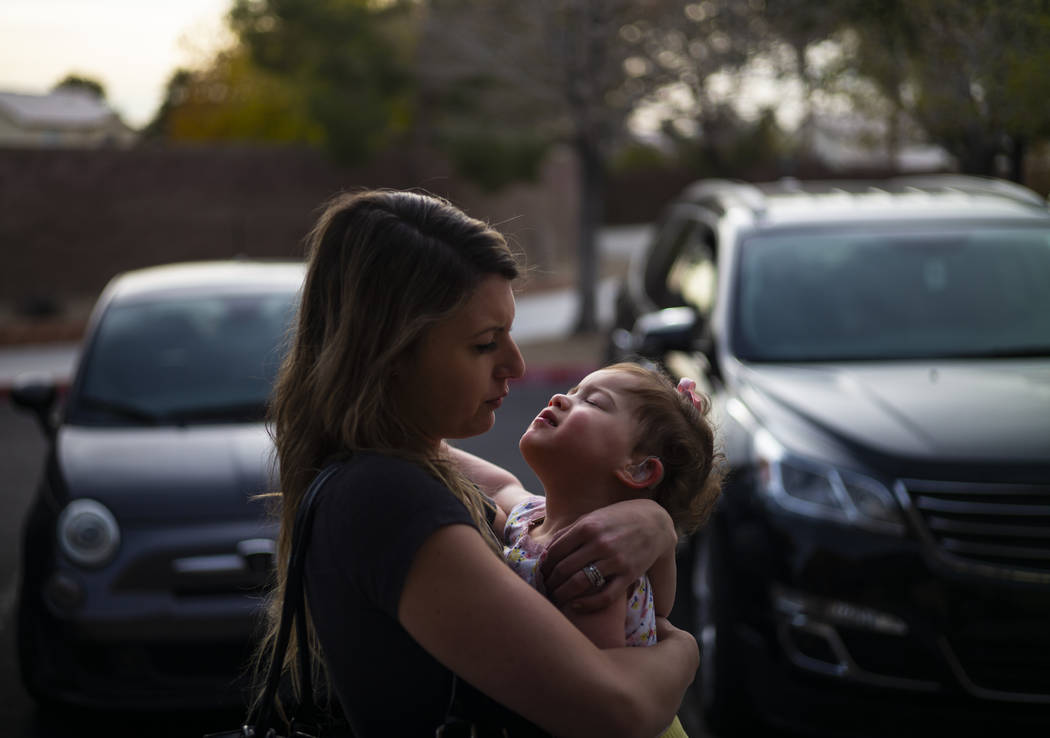
Truly a family affair
The boys are brewing up some amber beer in JT’s backyard. Standing at the simmering kettle, Ken and JT banter playfully. They’re the production team, while Lauren and Caren — who worked for years in the marketing department at Walgreens — are handling promotion. Lauren’s older brother, Brian, who also lives in Las Vegas, is pitching in with computer work.
Ken, now 59, was working as a UPS mechanic in 2010 when JT approached him about opening a brewery.
“I’ll help you, but you have to do all the paperwork,” Ken told his son-in-law. “Go put together a business plan. And then we’ll see.’ ”
JT did his homework. He found that there are some 7,000 craft breweries in the U.S., businesses that have enjoyed a 96 percent success rate. Still, he says, Nevada and particularly Las Vegas, remain microbrewery poor.
“Las Vegas is vastly under- served,” he said. “The industry seems bulletproof and the area is desperate.”
In January 2018, he hired an architect and a Realtor and got to work finding the right space. They pored over more than 100 listings, visiting many of the sites. They preferred Summerlin, which proved to be too expensive. They found a site near the intersection of Sunset and Rainbow, but JT soon winced at what he considered too much “weird red tape” required by Clark County, including expensive site tests he couldn’t afford. So they began looking farther east, near downtown. That’s when the architect told him of a vacant site in the Arts District that sits across from a thrift shop and metal fabrication warehouse. The good news was that the building owner specifically sought a brewery operation to inhabit the space.
By June, they’d struck a deal on 4,200 square feet of leased space JT is rebuilding, where he plans to produce 1,000 barrels of craft beer each year. Even after landing their site, he and Lauren continue to visit scores of breweries to research the right atmosphere.
JT submitted building plans, applied for a food manager’s card, underwent an FBI background check, all the while proving he had enough cash to move forward.
Meanwhile, officials considering JT’s small-business loan application required Ken, the brewer, to have a financial stake, rather than work as an employee, an arrangement they said would help guarantee success. So Ken invested $50,000.
Three months before the planned opening, JT still had no liquor license, but he’s not worried. He says that’s usually the last piece of the puzzle to fall into place.
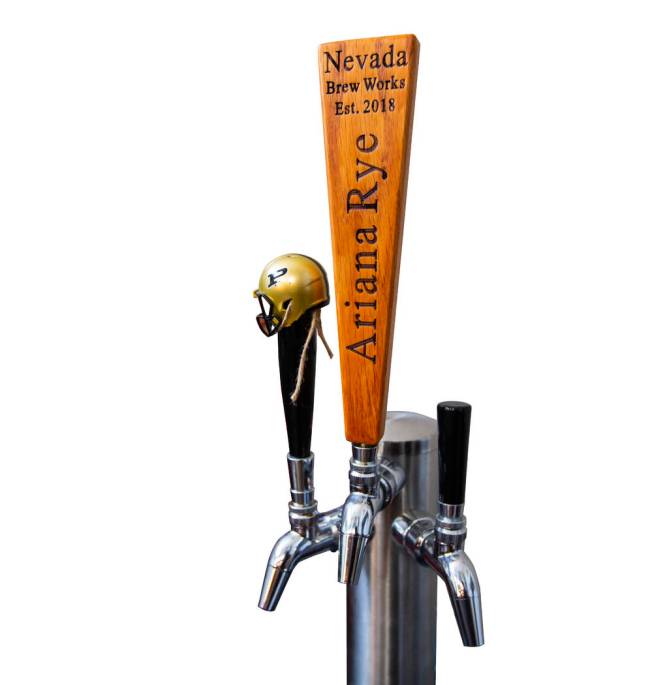
Last summer, JT met the owners of a handful of other breweries in the neighborhood and they traded advice. Rather than competitive, the atmosphere was supportive, with different owners knowing that success for one should help the others.
“Having five craft breweries in the Arts District will create synergy,” JT says. They don’t worry that their lack of industrial kitchen experience will be a factor, he says. “We’re keeping it very simple, focusing on the things we do very well. And Ken is actually a good cook. He watches all the cooking shows.”
Lauren’s parents sold their Chicago house and bought one in Summerlin. Ken retired from UPS and earned a brewer’s degree at the Siebel Institute of Technology in Chicago. While he’s never sold his beer commercially, Ken isn’t worried. “The process for home and commercial brewing is the same,” he said. “You just take your recipes and make them bigger.”
Ken is mainly looking for consistency.
“I like a malty beer, so with those I’m looking for a depth of flavor, with some deep coffee notes,” he said.
Even though he has invested $50,000 in the venture, Ken defers to JT on the big decisions. “He’s got his balls on the line for this. He wants it, he can have it,” he said. “If they lose it all, we’ll have room in our house for them.”
But Lauren doesn’t blink. “I don’t want to look back at age 50 and say, ‘Wow, we could have opened a brewery,’ ” she said. “If we fail and lose our house, we’ll just start over. It’s just a house. I really trust JT and my Dad. If anyone can do this, they can.”
There are still details to be worked out in their charity initiative. They are talking with tax experts on the best way to manage their planned Ariana Rye Foundation but haven’t registered as a nonprofit. And just what percentage of beer sales will be earmarked for the cause “will be worked out once we get started and see what sales are,” JT says.
On a cool mid-December afternoon, JT and Lauren tour their microbrewery site with their families, they articulate their dream, demonstrating how, with passion, planning and the patience of a shrewd gambler, you can turn an avocation into something so much more.
Gesturing with his hands, JT stands at the old repair shop’s defunct gas pumps and points to where the landscaped outdoor patio will go.
Wearing his “Nevada Brew Works” T-shirt, he explains how another microbrewery will inhabit the other side of the building, with a barbecue restaurant in between.
“Can you see the vision?” he asks.
The family poses for pictures. Ariana is there, as she always is, in her mother’s arms.
This story first appeared in the inaugural Spring 2020 issue of rjmagazine, a new quarterly published inside the Las Vegas Review-Journal.
Read the rest of the Spring 2020 issue here.



